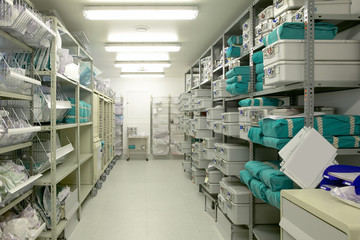Having access to top-notch laboratory materials and equipment is crucial in the dynamic field of scientific study and experimentation. Finding trustworthy laboratory supplies can have a big impact on the caliber and productivity of your job, whether you're a seasoned researcher, an aspiring scientist, or an educational institution. This article examines the vital function that laboratory supplies play, looks at the necessary equipment, and emphasizes the need of selecting the appropriate vendors.
Items for the lab: The Foundation Stones of Scientific Research
A broad variety of consumables and disposables required for routine experiments and analysis are included in laboratory supplies. These materials, which range from chemicals, reagents, and specialty plasticware to glassware like beakers, test tubes, and pipettes, are the foundation of any well furnished laboratory.
Glassware:
- Glassware is essential to many scientific processes because it makes precise measurements, mixing, and observation possible. Test tubes, beakers, and flasks are available in a variety of sizes and shapes to meet a wide range of experimental requirements.
Pipettes and Micro Pipettes:
- Pipettes and micro pipettes are essential for accurate liquid handling. They guarantee precise liquid dispensing, which is essential in disciplines like analytical chemistry, molecular biology, and biochemistry.
Chemicals and Reagents:
- Quality chemicals and reagents are the foundations of trustworthy experimental outcomes. To ensure uniformity and purity, laboratories must get items from reliable vendors.
Laboratory Equipment: Powering Scientific Advancements
- A variety of instruments made for certain scientific purposes make up laboratory equipment. They include everything from simple centrifuges and microscopes to sophisticated devices like PCR machines and spectrophotometers.
- Using centrifuges
- When separating components of a sample according to density, centrifuges play a critical role. In molecular biology, biochemistry, and clinical diagnostics, they have uses.
- Scientists may view and examine microscopic structures with the use of microscopes. Many scientific areas have been transformed by advances in microscopy, particularly electron microscopy.
- Spectrophotometers: Used to detect light intensity at various wavelengths, these instruments yield important data for quantitative study in various scientific domains, including biochemistry and chemistry.
- Selecting the Correct Suppliers: An Important Choice
- Just as important as the equipment's quality is the choice of trustworthy vendors for laboratory supplies. When selecting providers, keep the following points in mind:
- Credibility:
- Choose vendors who have a track record of producing dependable, high-quality goods. To determine their reputation, look through references, reviews, and testimonies.
- Authentication and Adherence:
- Verify that the suppliers follow the rules and standards set forth by the industry. A dedication to quality is indicated by certifications such as ISO accreditation.
- Product Range:
- Choose providers offering a wide choice of laboratory supplies and equipment. This guarantees a one-stop shop for all of your various requirements.
Conclusion:
It is impossible to overestimate the importance of laboratory supplies and equipment in the dynamic field of scientific investigation. Purchasing high-quality materials and apparatus from reliable vendors is an investment in the dependability and success of your scientific pursuits. The basis for scientific excellence is laid by having the correct tools, whether you're leading the next generation of scientists or doing ground-breaking research.





